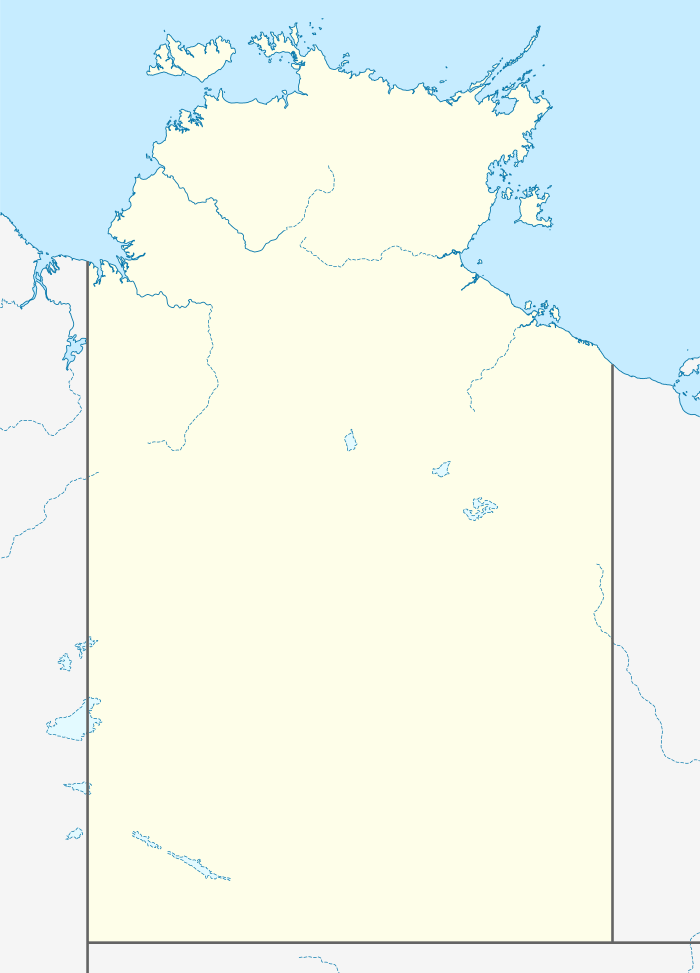Elsey Station

Elsey Station is a pastoral lease that once operated as a cattle station in the Northern Territory.
It is situated about 14 kilometres (9 mi) east of Mataranka and 68 kilometres (42 mi) north of Larrimah. The Roper River and many of its tributary creeks run through the property. The land is about 10% flood plain, 15% black soil country, 60% red sandy country and 15% ridge country.
The property is currently owned by the Mangarrayi Aboriginal Land Trust and managed by Max Gorringe and his family. Elsey occupies an area of 5,334 square kilometres (2,059 sq mi) of which an area of 2,200 square kilometres (849 sq mi) is fenced. In 2001 Elsey had a herd of about 7,000 cattle grazing on its pastures.[1]
The station is named after Elsey Creek that runs through the property. Elsey creek was named after Dr. Elsey who served as the surgeon who travelled with the Augustus Charles Gregory expedition from Victoria River to Queensland via the Roper River.[2]
The lease was taken up by Abraham Wallace in 1879 and he embarked on a trek from his other station, Sturts Meadow in outback New South Wales, in January 1880. Wallace headed north and arrived in Longreach, some 750 miles (1,207 km) from Sturts Meadow, where he bought 2,728 head of cattle and continued his journey eventually arriving in Elsey in July 1881 after covering a distance of about 2,000 miles (3,219 km). The property was later named Elsey Station and Wallace left the next day to return to Sturts Meadows.[3]
Aeneas and Jeannie Gunn arrived at Elsey in 1902, Gunn owned a quarter share in the property but died there in 1903 from Blackwater fever.[4] Jeannie returned to Melbourne and in 1908 wrote the book We of the Never Never based on her time at Elsey.[5]
In 1946 the filming crew for The Overlanders arrived at the Roper River camp the Station for a month, where the river crossing sequence was shot.[6]
The station was put up for auction by the owners, Elsey Downs Ltd., in 1951 and was advertised as covering an area of 2,250,000 acres (910,543 ha) and was stocked with 26,000 head of cattle.[7] The auctioneer tried to open the bidding at £200,000 but could only attract a bid of £140,000 from an agent acting on behalf of a Victorian syndicate, who assured that all historic landmarks on the property would be preserved.[8]
During the 1960s, Brahman cattle were introduced to the property which coincided with the appearance of Parkinsonia weeds at Elsey. The insect Penthobruchus germaini was introduced as a biological control for Parkinsonia in 1995, but it is still being poisoned to prevent it spreading.[9] In February 2000, the Howard government representative John Herron handed over the title deeds of the property in a formal ceremony at Elsey to the traditional owners of the area, the Mangarrayi peoples. The Elsey claim had taken nearly nine years to resolve.[10]
See also
References
- ↑ "Fire management on Elsey Station" (PDF). Tropical Savannas CRC. 28 February 2001. Retrieved 19 June 2013.
- ↑ "The Elsey Station". The Register. Adelaide: National Library of Australia. 3 March 1925. p. 12. Retrieved 20 June 2013.
- ↑ "Mt Wilson & Mt Irvine Historical Society- Historical Papers" (PDF). June 2003. Retrieved 19 June 2013.
- ↑ "Elsey Station NT". Flinders Ranges Research. 2012. Retrieved 19 June 2013.
- ↑ Rutledge, Martha (2000). "Gunn, Jeannie (1870–1961)". Melbourne University Press. Retrieved 19 June 2013.
- ↑ ""Overlanders" film unit returns". The Sydney Morning Herald. New South Wsles: National Library of Australia. 5 September 1945. p. 5. Retrieved 20 August 2012.
- ↑ "Elsey Station To Be Auctioned.". Morning Bulletin. Rockhampton, Queensland: National Library of Australia. 25 July 1951. p. 4. Retrieved 20 June 2013.
- ↑ "Elsey Station up for Auction". The Northern Standard. Darwin, NT: National Library of Australia. 27 July 1951. p. 1. Retrieved 20 June 2013.
- ↑ "Case studies – Community Initiatives" (PDF). weeds.org.au. 6 November 2004. Retrieved 22 June 2013.
- ↑ Alan Ramsey (2011). The Way They Were; The View from the Hill of the 25 Years That Remade Australia. UNSW press. ISBN 1742240224.
Coordinates: 14°57′04″S 133°21′00″E / 14.951°S 133.35°E
